Tech Hub's BIG BOSS

A serial entrepreneur with over three decades of experience in the information technology industry, Srinivas Rao Mahankali (MSR), CEO, T-Hub, had co-founded Aujas in 2008. A security service provider, Aujas was acquired by NSEIT, a subsidiary of National Stock Exchange. He was a board member and part of the promoter team at Network Solutions (Netsol), an infrastructure services company, which was acquired by IBM in 2005. Now MSR, is working on building a world class innovation ecosystem movement at T-Hub, in Hyderabad, Telangana. In an exclusive interview with Corporate Citizen, MSR talks about his journey so far, his mantra for successful startups, topping the innovation game, overcoming challenges, building and scaling businesses, and nurturing entrepreneurship at T-Hub.
"You have to be passionate about what you are doing. You have to be curious. You have to be flexible. You have to be adaptable. And, you must have plenty of determination, guts and grit. It’s very important to know somebody’s motivation, when he wants to do something. If you don’t have these, not willing to slog, it’s hard for those people to become successful."
-Srinivas Rao Mahankali
CC: What is your observation about HITEC City as a busy tech industry hub, compared to others across India, including Bengaluru?
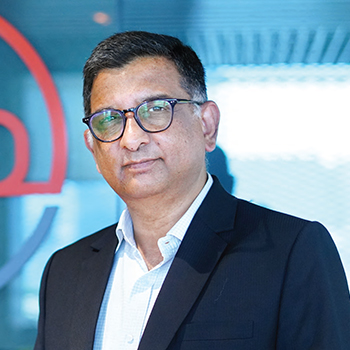
Historically by nature, the people here are entrepreneurial. Hyderabad is also a hub of pharma industry. So, if you think about what is required for entrepreneurship to happen — one is you need the mindset, second is you need high quality education systems, which we have here. Then you also need good connectivity - physical and digital, which we have here. Everything is here for people to build businesses.
We had a little bit of slowdown between 2007 to 2015, when the turmoil for the State was happening. But, 2015 onwards I think Hyderabad has changed. Most people who have lived here for a long time, will tell you that the kind of change which has happened here is probably not happening in any of the Indian city, in terms of pace of development of infrastructure, transportation and overall development.
Telangana today has the highest per capita income, across all the 28 states in India. Entrepreneurship and incubation that we are trying to do here—I think in last eight years, lot of work has been done to build the ecosystem, to support early stage entrepreneurs and to drive innovations. I feel very lucky and blessed to be in this place.
CC: T-Hub is a State-led startup incubator and innovation hub, can you tell us about the process of the T-Fund initiative that is led by the Telangana government under its State Innovation Policy.
Just to give you some perspective, T-Hub itself is essentially a public-private partnership. So, we the Government of Telangana, the International Institute of Information Technology Hyderabad (IIIT-H), the Indian School of Business (ISB) and the National Academy of Legal Studies and Research (NALSAR), are the four entities that have got together to set this up.
It’s a very unique construct, because rarely across anywhere else you have government, academia and industry come together. So if you look at the T-Hub Board, we have four industrialists, some of them are also investors, then we have nominees from each of these institutes, plus one nominee from the government, to set this up.
Some distinguished names who are a part of the board are- Mr.B.V.R Mohan Reddy (Founder of Cyient), Mr. Srini Raju and Mr. Sashi Reddy (Sri Capital), amongst others. So, while it is quasi government, it is designed to be
in such a way that the day-to-day management is done by people who are coming from the private sector, like me. I have never worked in the government before. I have been an entrepreneur, so I bring that entrepreneurial mindset into how we do things. That’s what we are trying to do here.
Specifically, on the T-Fund part the intent was that at an early stage, investors struggle to raise money. It’s hard till they get some level of traction in the market, able to build some revenue, build some scale—before that it’s generally and reasonably hard to get money. So, the intent of the T-Fund is to financially support early stage entrepreneurs. So far we have done about six investments—we started last year and hopefully this year we will see a lot more action. Two of the largest and promising space-tech companies Skyroot Aerospace and Dhruva, were incubated here in T-Hub.
CC: Are the startups in India ready to grab the opportunities that the telecom sector will open up with the launch of the 5G technologies?
What 5G will throw up is a lot of opportunities in many different areas. The whole healthcare space including diagnostics, and also areas like video conferencing and education. There will be more usages, as 5G becomes all pervasive. You will see a lot of startups starting to build very interesting solutions in this space.
CC: The Indian startups are now facing many challenges like inflation, interest rates, and war. India has very few profitable unicorn start-ups. Have we in India reached a saturation point and at present do things seem bleak for startup growth?
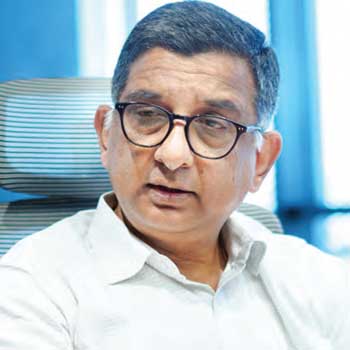
When you think about it, India has more than 85000 registered startups with The Department for Promotion of Industry and Internal Trade (DPIIT). That’s a large number and when you compare, we are the third largest in the world, after the US and China. However, when you think about the fact that we have 1.4 billion people, it’s still a small number. So, there is a lot of room—India probably needs a million entrepreneurs, because while we are growing we are still continuing to be one of the fastest growing economies anywhere in the world, despite the Covid pandemic, despite the disruption caused by the geopolitical tensions, which are there. Having said that we still have many challenges to solve across the country in multiple sectors like agriculture, health, education, apart from other areas of tech.
I always tell people that there is no better time than the present time, for young people to say, “Just listen, I have identified the problem, I can solve that problem, I can create impact, and obviously as a part of that there is also going to be some good economic outcomes for all the people involved as part of the journey.”
Fair amount has been done, there is a lot to be done. This so-called “Blip” that you are seeing—I call it a blip, because there are so many things which are happening today that are on the positive side. For example, what the government has done from the digital infrastructure perspective—we started with Aadhar, now we have the Account Aggregator, Open Network for Digital Commerce (ONDC), something going on in healthcare sector, will create a lot of opportunities for interesting innovations happening in that space.
I don’t think any large country has responded to the Covid pandemic, like we did. We didn’t have vaccines three years ago, but we are able to do it now. So, I think there is an opportunity for innovation. We will have cycles of slowdowns—what’s happening is some part of it is a reaction to what happened in 2021, when there was excess liquidity. Lot of money is coming into the markets. Some not so particularly well-thought through great ideas were also getting funded. Now, I think there is a little bit of return to sanity.
You can still raise money, provided the fundamentals that startups are building are strong. It has to be a good idea, good team, great execution—those don’t change. Many of the large investors have enough ‘Dry Powder’, they have raised a lot of capital.
If you have demonstrated all of these as a startup, identified a problem which is significant, which impacts a lot of people. Demonstrate that you can build something to solve that problem, and the solution has reasonable uniqueness. Then you figure out how to make money—you will get funded.
CC: The T-Hub in Hyderabad is touted as India’s largest startup incubator, which will be housing over 2000 startups. What is the process of your funding or the model you use to foster entrepreneurship and give rise to a new generation of founders?
Our model is very simple, we are essentially here to support early stage entrepreneurs. To provide all the support they require to set up and scale. So, we have put together a framework—we call it the “6Ms”.
The 6Ms are:
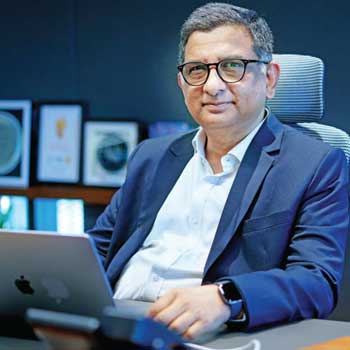
1) Methodology: It is about helping the startups with methodology—for example if you are an early stage startup, you have an idea and you have to figure out how to convert that idea into a minimum viable prototype (MVPr) or you have a startup where you only have a traction and now you need to scale—we have programmes for the Methodology part. We have four programmes — there is a programme called Master class, Lab32, Rubrix and T Angel. Typically, in a year 250+ startups get to be part of our programmes. These programmes are priced very attractively. The intent is to keep a small fee because if you have a fee there is a certain amount of seriousness. If there is something given away free, you don’t value it as much. And, we go through a screening and selection process. We also create an alumni network—once you are part of our programme, you are alumni for life.
2) Market Access: The second part is helping the startups with market access—the big challenge for any startup is how do you acquire customers. Depending on whether you are B2B or B2C—for B2B you need access to corporate, government, defence etc. We have to facilitate all of that so the startups get in front of potential prospects.
3) Money: It is about how you help a startup raise some funding. So, we do a lot of work to help the startups.
4) Motivation: How do you keep them motivated and inspire them. We get people who have been successful entrepreneurs to come in and talk to them and support them.
5) Mentoring: Most startups will benefit from having a good set of mentors. What does the mentor bring to the table—I call it “3Cs”— a good mentor will bring credibility, contacts and counsel. When I say counsel, I mean good advice. So, helping them get good mentors, who can provide all these elements.
6) Manpower: To get the right people to work for startups.
T-Hub is a thought through, long term engagement, where we support the entrepreneur through their journey. For our methodology part, our programmes vary from four to six months.
Any relationship of any kind, be it professional or personal, has to be based on a give and take principle. Both parties have to give something and take something. And, if you don’t figure out how to balance interest, that’s where the challenges are.
CC: T-Hub runs on a public-private partnership (PPP) funding model, so who envisages and evaluates or takes the final decisions, operationally and logistically?
We are a boardroom entity; I report to the board. The board comprises members who are from government, industry, and academia. Obviously, on a day-to-day basis operationally I have autonomy to do what is required to be done to support our entrepreneurs. Large numbers of our entrepreneurs are local, but today I guess through the Covid pandemic, we also have moved to phygital form, so today our entrepreneurs are from across India.
CC: The Silicon Valley Bank (SVB) has been the banker of choice for the global startup world, including Indian entrepreneurs. What impact will it have to our entrepreneurs and startup ecosystem in India?
To some extent it would. For example, anything like this which is large will have some impact. SVB has been the banker of choice, not necessarily for the Indian startups, but some startups which have been part of specific programmes could have had their funding as part of SVB. Certainly, one way to look at it is, in every crisis there is an opportunity. If you look from investor perspective as well as from a founder perspective, some of whatever is happening is in some way good. Because, when you have something like this happening, you have to relook what you are doing, see that it is relevant—you are almost stress-testing the business. So, how well you withstand that, how well you overcome it, is part and parcel for many entrepreneur’s lives.
CC: At present, almost 75 percent of the funds flowing into Indian startups are coming from foreign investors. Is there a need to radically change that?
It is changing now—I think a lot of these investments have come from outside. Clearly now, startup investing as an asset class, is starting to become attractive. So, there are a lot of people, both who have been successful entrepreneurs themselves or are holding senior positions in corporates, have now started to look at this as an asset class. So, if you have typically a portfolio which has some investments in the primary market, some investments in your own business, or some investments in real estates, gold and so on, you are also starting to look at startup investing as an asset. If you look at the number of angel networks that have come up, the number of entrepreneurs who have been successful, now are starting to invest in startups.
First of all identify a problem which is significant, which impacts a lot of people. You have been able to demonstrate that you can build something to solve that problem. The solution has reasonable uniqueness. Then you figure out how to make money—you will get funded.
CC: There is a lack of an equitable ecosystem that promotes innovation and entrepreneurship among women in India, so what is T-Hub doing to promote and empower women entrepreneurs?
I can talk from the point of view of what we are doing in Telangana. Essentially, we have T-Hub, and we also have another entity called WE Hub, which is run by a counterpart of mine. And, the intent of this is to support all women led businesses. T-Hub also started to engage with FLO (FICCI Ladies Organisation) Hyderabad Chapter, over here. Clearly, we understand that there are challenges, we have society pressures, some level of inhibition on the part of women to get into entrepreneurship—that’s slowly starting to change. We are starting to see more and more both in terms of participation into the labour force as well as women who are now saying that we will start business on our own.
CC: In one of your articles you have urged innovation leaders to tread carefully when forging alliances with foreign collaborators. Can you elaborate on that statement of yours?
Any relationship of any kind, be it professional or personal, has to be based on a give and take principle. Both parties have to give something and take something. And, if you don’t figure out how to balance interest, that’s where the challenges are. And, if you look at some of the reasons why some of these things don’t work, it tends to get apart where there is no give and less take. So, you have to just be careful, how you structure your engagements, how you structure your contracts, agreements and so on, so that it is equitable on both sides and it is win-win for both.
CC: Slow processes within corporates, red-tapism in the government machinery or hurried decisions implemented by ‘impatient to grow’ startups are some of the reasons that could impede the pace of innovation. How are we in India taking steps to improve on these parameters?
If you look at say Ease-of-Doing-Business, India is definitely getting better in the last few years. Many years back doing business was regarded not necessarily in highest order. Today there is appreciation of the value, entrepreneurship, social benefits apart from economic benefits of gains—so that’s clearly starting to happen. Lot has to be done and some more needs to be done like always, but clearly there is recognition among policy makers. Entrepreneurship is going to be the single biggest growth lever of economic advancement and job creation. It is given today that without entrepreneurship we will not be able to create jobs. Without creating jobs, we will not grow economically.
CC: How are you at T-Hub engaging with academia?
We have launched several new programmes recently in different areas and sectors. There are 33 districts in Telangana—so how do we ensure that we will not restrict only to Hyderabad and our effort is how do we expand to tier-2 cities in Telangana. We are also talking to other states across India, to come here, spend time and understand what we are doing and see how they can replicate similar models in their states.
We have a programme, where we are working with colleges and universities here in Hyderabad. So essentially when you think about entrepreneurship, it works well when it is inculcated as a mindset at an early stage. We have a programme with colleges called “Kickstart” where we are now working with colleges to help them setup model incubators, So, we have signed up with three colleges and hopefully we will do more in the future. There are few colleges from other states who have reached out to us.
One of the things we are very much conscious about, given our reputation, we must expand slowly. There is a huge obligation on our part that whatever we do we must do well—must be well thought through, well- constructed, capable of replication, and we are doing all of that.
Clearly now, startup investing as an asset class, is starting to become attractive. So, there are a lot of people, both who have been successful entrepreneurs themselves or are holding senior positions in corporates, have now started to look at this as an asset class.
CC: Can you elaborate on your mantra for startups?
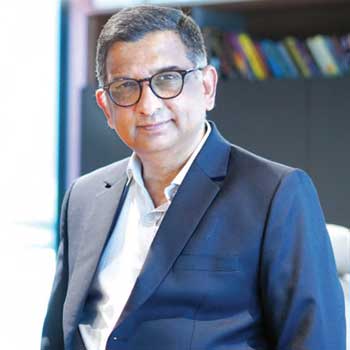
First of all, for any startup to be successful, you have to constantly be reflective on what you are doing. What is the basic premise on which you started? Are you holding true to that purpose? What is the problem you are solving? Is that problem you are going to solve, going to create impact at scale? Have you figured out what it will take for you to scale? These are the questions which you have to keep knowing the answers to. It is not just for startups; it is also for large companies. Particularly for a startup, till they get to a certain growth, certain stability, certain traction, everyday can be a day for constant struggle to keep running faster, quicker, smarter.
CC: What are the skills required to be a successful entrepreneur?
One, you have to be passionate about what you are doing. You have to be curious. You have to be flexible. You have to be adaptable. And, you must have plenty of determination, guts and grit. It’s very important to know somebody’s motivation, when he wants to do something. If you don’t have these, not willing to slog, it’s hard for those people to become successful.
CC: There are many promising startups with innovative ideas in India, but they are stuck at the idea-stage and lack funds, do not understand the investor’s perspective, do not reach out to the right stakeholders. Do you at T-Hub play the role of bridging these gaps?
We do a lot of work with them—one of them is the funding programme. We work with the startups, really grill them on what they are doing. To think about—if you are asking investors to put in money in your business, the investor in many cases is managing somebody else’s money, it’s not necessarily coming in from investors’ resources. A fund would typically have a General Partner (GP) or Investment Partner (IP) — IP are the people who are investing the fund and GP is who is managing the fund. The GPs are money managers for somebody else’s money, so he has the responsibility to ensure that the money scales.
CC: How do you balance your work and life?
I am fortunate to have a very supportive family. My better half, Karuna, is an engineer. She quit at some point because we realised both of us can’t burn both ends of the candle. She is now a special educator; she teaches students with learning disabilities. I have two daughters, one lives in Singapore and the other lives in Seattle, the US.
When you like what you do, you don’t regard it as work. Generally, I like everything I do. I always believe that irrespective of what you do for whatever hours, you should always go back home at the end of a long day. You should be able to reflect and say what did I do today to help advance the cause I am working for. And, as long as you get more positive affirmation that whatever you are doing has helped somebody get better, you sleep well and you will come back the next day saying, let’s do something more.
From Bench to Boardroom
For any startup to be successful, you have to constantly be reflective on what you are doing. Till they get to a certain growth, certain stability, certain traction, everyday can be a day for constant struggle to keep running faster, quicker, smarter
Srinivas Rao Mahankali: I am very blessed to be born in a family where essentially all are either doctors or engineers. My father was working in The Indian Railway Service of Engineers (IRSE)—thus I got to see a lot of India in my childhood, and also had the chance to move in schools all over India. Later I pursued my Bachelor of Engineering degree in Electrical and Instrumentation, from Osmania University, in the year 1981.
In those days the number of colleges in Hyderabad was not as many as we have now. We had Osmania University, Jawaharlal Nehru Technological University (JNTU) and Regional Engineering College (REC), Warangal. We had an exam called EAMCET (engineering and medical common entrance test). I appeared for that exam and based on my ranking I got a seat at Osmania University. I enjoyed doing Electrical Engineering programme—these four years in college were blissful. Apart from studying we had plenty of room for sports and extracurricular activities.
Engineering to Management
During those days, almost 40 years ago, I was contemplating either going abroad or appear for the Civil Services, or doing an MBA programme. I was not very keen on going abroad. Academically I did well in engineering, but I also realised at heart, I was not cut out to be an engineer. There are things you can do reasonably well, but you may not necessarily be very passionate about it. I felt an MBA would be of my interest—I had a few friends who had gone to different Indian Institutes of Management (IIMs). I appeared for the CAT and I got into IIM-Bangalore. At that time there were only four IIMs — Ahmedabad, Bangalore, Calcutta, and Lucknow (A, B, C and L). I got interview calls from all four, got selected in three - B, C and L, but chose B.
After my MBA at IIM-B, I worked for 12 years in relatively small companies. The term ‘startup’ was not fashionable then. These were companies like Sonata Software (Bengaluru), Computer Vision Laboratories India Ltd (Hyderabad), Microland Ltd (Hyderabad- Bengaluru) and so on. I worked very closely with the founders in these three companies and I realised that they are really doing good work and I learnt a lot working closely with them. So, I contemplated to start something myself.
The IIM culture experience
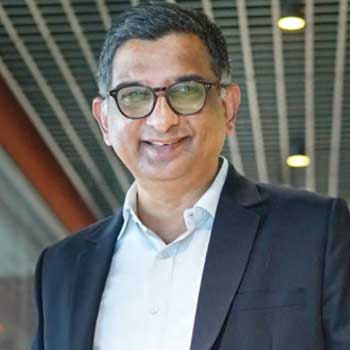
In the beginning it was a bit of culture shock at IIM. While doing engineering, most of us were about 17-18 years’ age, and at IIM there were very few of us who came from engineering background. We had classmates who had work experience of 7-8 years—we were a small class of over 85 students and there were perhaps 10 of us fresher’s who got in straight from a college. Secondly, unlike engineering where most of the students are local, at IIM we had classmates from all over India. Those who had quit their jobs for two years and got into IIM, were fiercely competitive. So, it was a step up—it is competitive, it is different and the amount of work you had to do was huge. At the IIM then, you had short terms of three months and the method of learning was also different. Lots of case studies were included. It was not so much of what you did in the class but what you did outside the class. It was a great learning experience, made many great friends and had great exposure—a very interesting and challenging time with a fair share of extracurricular activities. At that time, I used to be a very active quizzer and was also featured on NDTV quiz show hosted by Siddhartha Basu, who is widely regarded as the ‘Father of Indian television quizzing’.
Time to become an entrepreneur
In some way whatever has happened in my career journey, has happened by chance and not by design. In 1994, when I was working in Microland, which was the third job I was in, I was Product Manager for a couple of products. That was the time when many of the MNCs were starting to come into India, after the liberalisation. I was handling a couple of networking products.
It so happened that one of the customers we worked with was in a company called Motorola. Motorola was setting up a factory in Bangalore and we were designing and implementing the network for them. We had suggested a couple of products, including technology called 100BASE-T, a one-of-a-kind networking standard. There used to be a large company called Synoptics, which doesn’t exist now—they were building the product and we were the system integrator for the product. Unfortunately, that product got delayed, because there were some design issues. It took about a year to be shipped and in that one year there was a consultant from Motorola, Sudhir Sharma, who was responsible for setting up this network and was my point of interface.
When you get an order from a customer and don’t deliver for one year, two things can happen — one is you make an enemy for life or you make a friend for life. Sudhir and I became good friends and we got along very well Sudhir was going to start a company later.
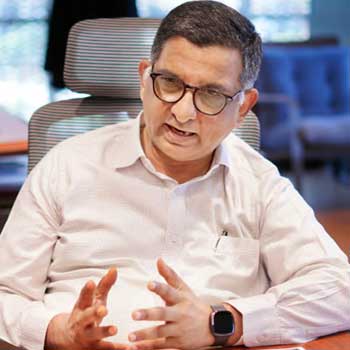
One of the many things I did at Microland was setting up an education business from scratch. We had centres in Bangalore, Hyderabad, Delhi, Chennai, Mumbai—I set up all of those. We were also trying to do business outside India, so we would go to the Middle- East, Hong Kong, Singapore and so on.
While on a trip to the Middle-East, I met Sudhir at the airport, he was flying to Bombay. He told me, “How long are you going to work for somebody else?”. He said that he was going to start something and asked me whether I would like to participate. I just joked that I am doing well, why would I want to do this. But, one day while I was in Muscat—I had two-three hours for myself and thought that Sudhir’s offer sounds interesting and it was an opportunity to work with someone who you know well. So, in 1999 when I was about 35 years old, I decided that if there is a time to become an entrepreneur, it is now.
I had a very supportive family. My wife is also an engineer, who worked with Tata Consulting Engineers (TCE)—she used to design power plants. I spoke to her about the opportunity I had and my willingness to do it. What is the worst thing that can happen if it fails? I can always go back and get a job. I had qualifications and had worked for 10-12 years.
First sprint in entrepreneurship
My first sprint in entrepreneurship started in 1999—five of us were part of a company called Network Solutions, in Bengaluru. We built it, scaled it for the next 5-6 years. Then in 2005, we got acquired by IBM. I had to be there for a couple of years. I moved out in 2007 and did a stint with Cisco, which was the only stint I had with an MNC for six months. Again there was a friend there who had taken over as the Cisco Country Head, who called me and asked me, how long I am going to be in IBM. I said that I am waiting for the mandatory period to get over to move out. Cisco was a good company and I got to learn how a large company works. I spent eight years in Network Solutions—once you are bitten by the entrepreneurship bug, it is very hard to let go of it.
As long as you get more positive affirmation that whatever you are doing has helped somebody get better, you sleep well and you will come back the next day saying, let’s do something more
Getting in cyber security
Cisco was great, but I learnt that this is not something I want to do for life. I moved out and dabbled in healthcare for a while. A friend of mine was doing very interesting work, treating Arthritis. But then, I realised healthcare is not my domain and so in 2007 I moved to Chiratae Ventures, which used to be called IDG Ventures in those days.
One day I met Sudhir Seti, who is the chairman of the firm, Chiratae, a very large fund with lots of different unicorns. He asked me what I was doing and honestly I answered that I am finding what is the next thing to do. He told me, “We are looking at something to do in cyber security, can you help us find a company where we can invest?”. I looked around and didn’t find anything interesting. After some time, the conversation led to a point where he said, “Why don’t you yourself start something.” I said, “What do you need me to do, to do this?” He told me to first assemble a team, then put together a plan and if both of those are good, they will fund me. It was a golden opportunity—I worked on it for three-four months and put together a team and plan. Aujas is the entity which I set up in February 2008.
So, two Sudhirs have played a big role in my life, one is Sudhir Sharma and the other is Sudhir Seti.
I had run Aujas for 11 years. We had a good journey and later went on to raise some more funding and in 2019 we exited that company. Aujas was acquired by NSEIT in March 2019, a 100 per cent wholly owned subsidiary of National Stock Exchange.
Entrepreneurship is great fun
After Aujas, I had a mandatory lock-in period for some time. I was contemplating, should I do a third startup. But one thing you realise in India, that it takes over ten years to build a business. When you do something for the first time, particularly entrepreneurship, it is about trying to prove something—we can also do something and create something—which I had done. Second time when you do, it is about how do I prove that the first time was not a fluke. Now if you want to do something the third time, to some extent I would call it masochism.
Entrepreneurship is great fun most of the time, but at some point you don’t necessarily enjoy it as much. For example, I used to travel quite a lot, somewhere between 100–150 days a year. I would be flying often and at some point it gets to you. So, I thought let me do something different. In 2020, after I finished one year with Aujas NSE entity, I decided to step out. In the year 2022, I joined not-for-profit social impact space Global Alliance for Mass Entrepreneurship India (G.A.M.E India), as their CEO. It was my first full exposure into the social impact space. I relocated to Hyderabad, as my parents used to live there and it was an opportunity to come back.